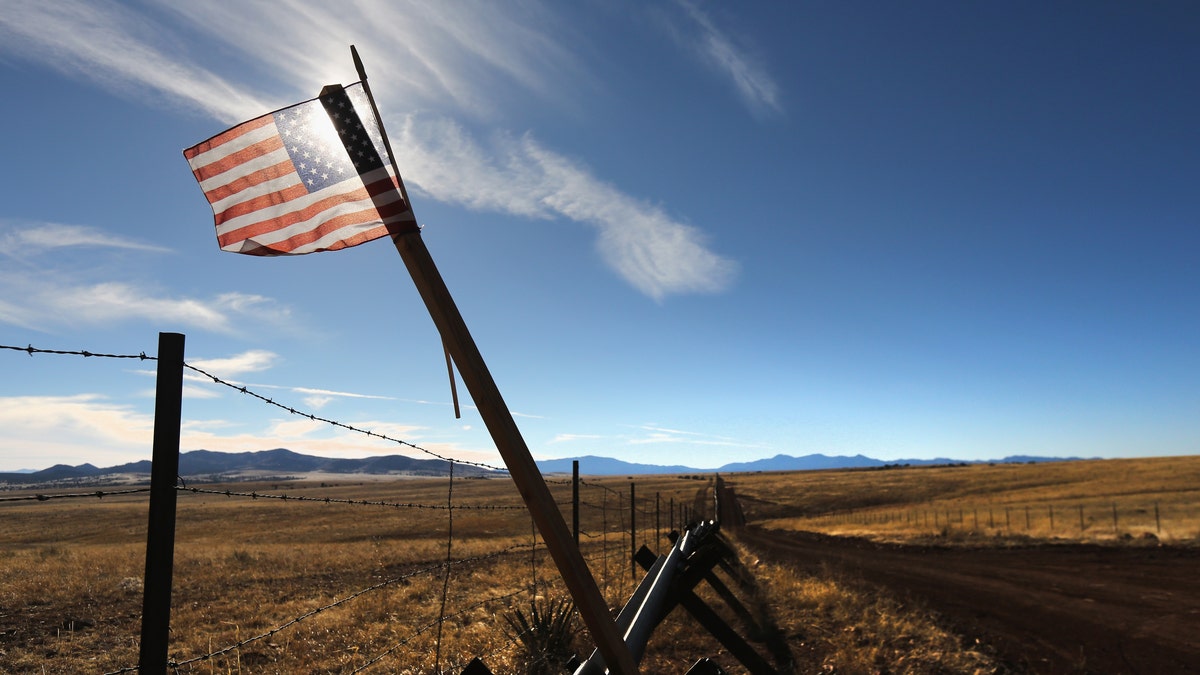
SONOITA, AZ - FEBRUARY 26: An American flag flies at the U.S.-Mexico border on February 26, 2013 near Sonoita, Arizona. The Federal government has increased the Border Patrol presence in Arizona, from some 1,300 agents in the year 2000 ro 4,400 in 2012. The apprehension of undocumented immigrants crossing into the U.S. from Mexico has declined during that time from 600,016 in 2000 to 123,000 in 2012. (Photo by John Moore/Getty Images) (2013 Getty Images)
When our country is attacked, it’s natural for us to be afraid, cautious, and apprehensive about letting outsiders in.
And that’s what happened after last week’s Boston Marathon Bombing.
This senseless terrorist attack, and the ensuing manhunt that gripped Boston and its suburbs, has brought the immigration issue front and center along with calls to put the debate on hold.
Alienated young people who are not part of the mainstream are potentially more harmful to America.
Senator Rand Paul sent a letter to Senators Harry Reid and Mitch McConnell where he argued that immigration reform be put on hold until Congress fully investigates the Boston bombing and potentially adds new protections into the legislation. And appearing on ABC’s This Week, Senator Dan Coats suggested it would be “bad policy” and a "rush to judgment” for us to fix our broken immigration system now.
But that is the wrong approach.
Using the Boston bombings as an excuse to halt immigration reform not only politicizes this tragedy, but prevents us from becoming safer!
In fact, the more we learn about the tragedy in Boston, the more we see that there is no better time for us to tackle immigration than now.
The Boston Marathon bombing wasn’t brought upon us by undocumented or “illegal” immigrants. Rather, these were two documented immigrants to this country. The Tsarnaev brothers came here seeking asylum and a better life. They were legal, with the younger brother becoming a naturalized citizen just a few months ago —on September 11, of all days. They were “on the grid,” and very much on our radar, with the FBI having received a warning about the elder Tsarnaev from Russian intelligence in 2011.
To be sure, there are lots of issues raised by the actions of Tsarnaev brothers —what causes two immigrants to become radicalized, was there a failure of our intelligence apparatus? But none of these issues should stop us from fixing the decades-old problems in our immigration system.
In fact, one of the major things that immigration reform will do is address the 11 million people who are now living in the shadows. We need to identify these undocumented immigrants, and the sooner the better. Putting immigration reform on the back burner slows down this process, and that is dangerous: we need to accelerate counting and identifying these people, and we need to begin keeping track of who comes and goes in this country.
Identifying undocumented individuals is only one part of immigration reform. Equally important is tracking immigrants — not just those who are undocumented but also those who are “documented” at one time or another or in one form or another.
As many as 40 percent of visa recipients overstay their allotted visits.
Amine El Khalifi, the suspect in an alleged bomb plot against the U.S. Capitol, had been living illegally in the United States for 12 years at the time he was arrested. This is just one example highlighting our government’s failure to track millions of foreign visitors who stay in the country longer than they are allowed.
The Tsarnaev brothers had the opportunity to come and build a life here in the U.S. — an opportunity that others can only dream of, an opportunity that they squandered. Ruslan Tsarni, their uncle, gave a passionate interview to reporters last week. His love of this country was evident, heartfelt and poignant. He said, “I respect this country. I love this country — this country which gives a chance to everybody else to be treated as a human being.”
When asked what he thought might have motivated his nephews to commit terror, Tsarni responded, “[B]eing losers… Hatred to those who were able to settle themselves [in this country].”
Alienated young people who are not part of the mainstream are potentially more harmful to America.
Immigration reform is not just about a path to citizenship for undocumented workers. It’s about creating a system to help make America safer.
